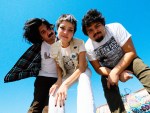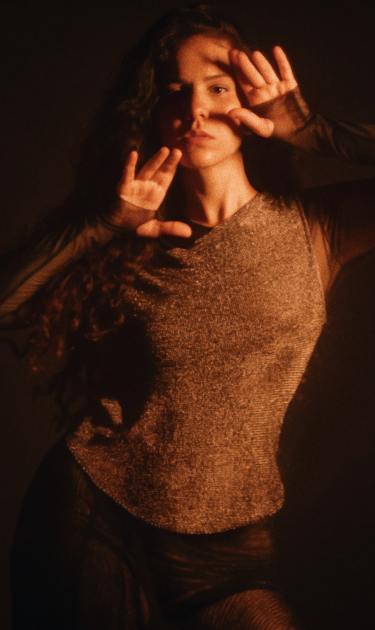Back in March 2022, La Marimba took the stage at Santo Domingo’s massive Olympic Stadium, opening for British alt-pop superstars Coldplay during their blockbuster Music of the Spheres Tour. Clips circulated Dominican social media as the statuesque singer-songwriter powered through favorites like “Agua Que Llegó” and “No Se Puede Apagar,” bringing a welcome dose of merengue, gagá, and Caribbean experimentalism to the show. Dressed in yellow macrame garments and long free-flowing locks to match, the singer’s bohemian cool contrasted against her instrumental proficiency as she scratched the patina off a gigantic golden güira. With such exposure, exciting new gigs began to materialize: She portrayed merengue típico icon Fefita la Grande in the biographical film La Grande (2024), and she recently released her highly anticipated debut album, Tengo Lo Podere, at the glitzy Isle of Light Festival. And that’s just the beginning.
“Chris Martin walked up to me at the after party talking about some of my oldest videos, where I haphazardly looped things, which was crazy!” recalls La Marimba, speaking with Remezcla while on a recent trip to Guatemala. “It’s funny because I was super comfortable at that show, and a few weeks later, I played for children at a local school, and I was way more nervous. Looking back, I’m so grateful for everything that’s happened since and all the amazing opportunities that brought me to where I am today.”
Serendipity aside, La Marimba has put in the work. The effervescent, multi-disciplinary artist born Mariela Pichardo recalls a natural attraction to music and a plethora of instruments. She pinpoints the bohemian bug as a genetic trait passed down from her grandfather, who played son professionally. At 10-years-old, while at church with her Pentecostal aunt, she was transfixed by the percussive breaks of güiras and handmade tambourines, which she now links to Afro-Dominican traditions in música de salve and trailblazers like Enerolisa Nuñez. As a teenager, she picked up the piano and the guitar, covering Portishead and Massive Attack, until her real schooling began when she joined jazz-fusion master Toné Vicioso’s influential band, Aumbata.
“They took me to my first zarandunga and my first gagá and helped me develop my natural musical language,” says La Marimba of her formative years with Aumbata before launching her solo career in 2017. “Immersing myself in roots music caused me to neglect my freakier, rocker side. I love tambores, but I also love electricity and distortion.”

On Tengo Lo Podere, tradition and avant-freakiness collide in spectacular fashion, where cathartic cuts like “Suéltame” pair galloping drums with fluttering synths, underscoring liberation, personal and creative, but also from third-party expectations. La Marimba describes the record as imbued with energetic “certainty” and acceptance that she and her art are enough, and her songwriting is guided by a pendulum of emotions. In lighter moments, such as “Cuando ‘E,” she unpacks her impulsive, adventurous nature, while darkness and sorrow creep into “Encamíname,” where she faces death and the process of accompanying loved ones through mourning. However, one of her greatest allies during the album’s production process was her daughter, who was growing in her belly as she recorded vocals, injecting each word with a hopeful new dimension.
[Being part of Aumbata] helped me develop my natural musical language. Immersing myself in roots music caused me to neglect my freakier, rocker side. I love tambores, but I also love electricity and distortion.
“Motherhood has opened a new universe of possibilities,” she says. “I didn’t think I’d have kids because parenthood is so demanding, and music already took up all my time. I used to say music was my baby, but now I feel like I can do anything, and raising this child isn’t taking away from my career. Quite the opposite, she’s helped me discover new potential, like with the movie.”
The movie, of course, is La Grande, the biopic of merengue icon Fefita La Grande, where La Marimba portrays the strong-willed campesina throughout her teenage years and well into her forties. She shares the titular role with the actresses Fahdly Jacobo, who plays Fefita as a child in rural Santiago Rodríguez, and Lumy Lizardo, who embodied the older, brassier, campy legend we know today. La Marimba was tasked with bringing to life Fefita’s tumultuous rise to fame and even studied her signature instrument with La Doncella del Acordeon, delivering a star turn that earned a Best Actress nomination at the prestigious Premios Soberano.

“When I went to Santiago [de los Caballeros] and met Fefita, I just thought, ‘Wow, this woman has so much power!’” remembers La Marimba. “Working on this movie was beautiful, and being close to her throughout, seeing how she’s a strong woman, but also a sweet, tender woman… I can’t tell you how honored I feel.”
So, what’s next for La Marimba? After her whirlwind performance at Isle of Light, followed by the Soberano awards ceremony on March 25, she plans on heading into the studio to begin working on her next album, which is being produced by dembow-shoegaze madman Mediopicky. She is also manifesting a lot more film work in the future and is happy to enjoy the quiet moments with her family.
“I plan on maintaining this rhythm of creativity and output,” she says with a smile flashing. “I know this momentum is hard to come by, so I plan on making the most of it.”

